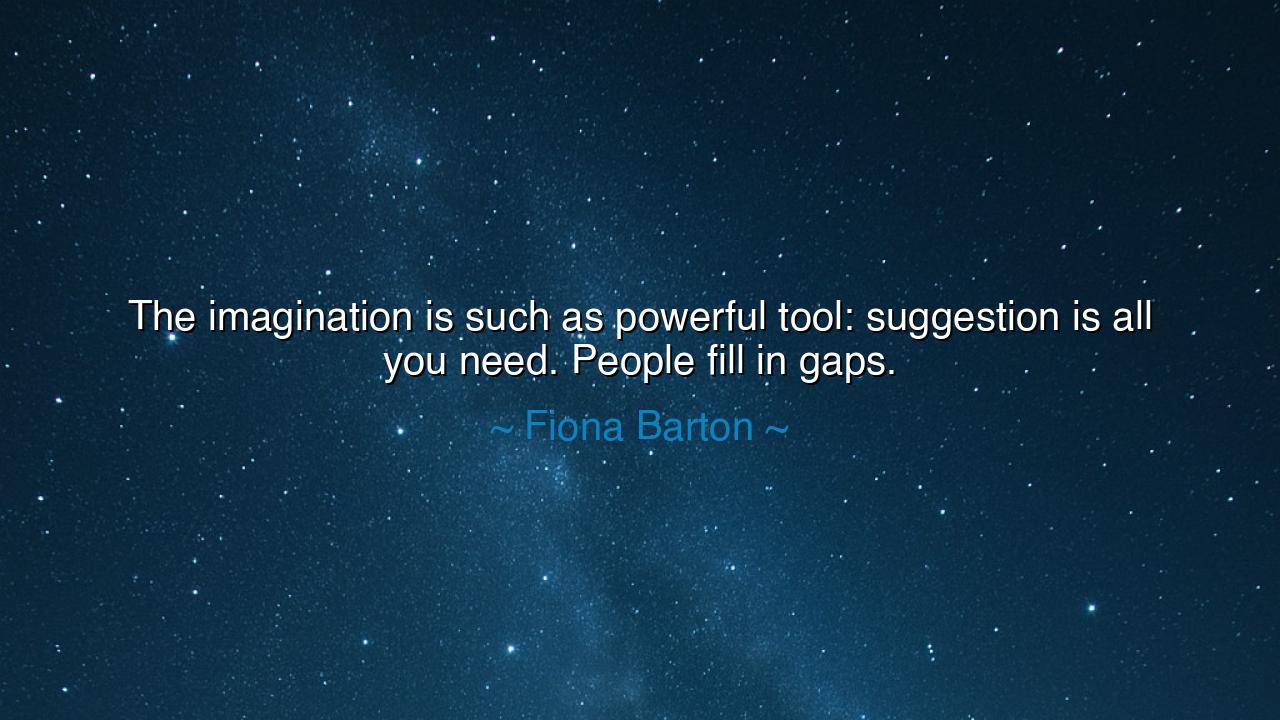
The imagination is such as powerful tool: suggestion is all you
The imagination is such as powerful tool: suggestion is all you need. People fill in gaps.






The words of Fiona Barton — “The imagination is such a powerful tool: suggestion is all you need. People fill in gaps.” — reveal an ancient and subtle truth about the human spirit. From the beginning of time, the mind has been not merely a vessel for thought, but a creator of worlds. With the smallest whisper of suggestion, the imagination builds whole universes within the heart. What is not said becomes as potent as what is spoken; what is unseen becomes more haunting than what is revealed. For the imagination, once awakened, is a flame that feeds itself — lighting every shadow, filling every silence, and turning mere hints into infinite visions.
In these words lies a secret known to every storyteller, prophet, and philosopher who has ever sought to move the hearts of humankind. The power of suggestion is the power of participation — for when the listener or reader is invited to imagine, they become co-creators of meaning. The ancient poets understood this. Homer, in his tales of gods and heroes, did not describe every battle blow or every tear shed; he left spaces for the heart of the listener to complete. The mind fills the gaps, and in doing so, it invests the story with life drawn from its own depths. Thus, every listener hears a different song, and every soul sees a different dawn.
The imagination is not merely a tool for creation; it is the bridge between souls. Through it, we understand one another not by fact, but by empathy. When a writer, an artist, or even a leader suggests rather than commands, the audience’s inner world rises to meet the idea. In this way, imagination becomes communion — the silent harmony between two minds, where the unfinished word becomes a shared revelation. Barton, a writer of suspense and mystery, speaks from this truth: that what is left unsaid often grips us more deeply than what is fully explained. Mystery, when touched lightly, draws the spirit forward as the moon draws the tides.
Consider the story of Alfred Hitchcock, the master of cinematic suspense. He understood the imagination’s power better than most. When he made Psycho, he showed no violent act in full — yet audiences screamed as though they had seen murder with their own eyes. Why? Because suggestion awakened something primal within them; they filled in the terror themselves. Hitchcock once said, “There is no terror in the bang, only in the anticipation of it.” He and Barton speak the same wisdom — that the human mind is the true stage of drama, and imagination, once stirred, needs no proof to believe.
The ancients, too, practiced this art in their teachings. The parables of the wise were often veiled in symbols, not because they wished to hide the truth, but because they knew the heart learns more deeply when it must discover meaning on its own. A truth handed down plainly is remembered for a season; a truth uncovered by the imagination is remembered for life. Thus, suggestion is not deception — it is the highest form of teaching, for it invites the listener to awaken their own inner vision.
But there is also warning in Barton’s words. For what inspires may also deceive. The imagination, when untamed, fills the gaps not only with beauty but with fear. A rumor whispered can grow into an empire of falsehood; a half-truth can ignite a thousand passions. The same power that creates can also destroy, if guided by malice or ignorance. Therefore, to wield imagination wisely, one must temper it with discernment, humility, and compassion. Suggestion, like fire, must be handled with care — for it can warm or it can burn.
Let this then be the lesson for all who speak, write, or dream: respect the imagination, for it is the mightiest of human powers. Speak not to fill every silence, but to awaken thought. Show not every truth, but kindle the desire to seek it. When you create, leave space — for in that space, others will find themselves. And when you listen, be mindful of the suggestions that take root in your mind, for they shape the reality you live.
As the ancients would say, words are seeds, but imagination is the soil. The harvest depends not only on what is planted, but on how deeply it is allowed to grow. Therefore, sow with intention, and guard the garden of your mind. For suggestion is all you need — and through it, you can awaken worlds, inspire nations, or heal the wounds of the soul.






AAdministratorAdministrator
Welcome, honored guests. Please leave a comment, we will respond soon